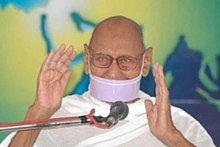Acharya Mahapragya
| Acharya Mahāprajña | |
|---|---|

Mahapragya
|
|
| Religion | Jainism |
| Sect | Svetambara |
| Personal | |
| Born |
14 June 1920 Tamkor, Rajasthan, India |
| Died | 9 May 2010 (aged 89) Sardarshahar, Rajasthan |
| Parents | Tola Ram Choraria and Baluji |
| Senior posting | |
| Predecessor | Acharya Tulsi |
| Successor | Acharya Mahashraman |
Acharya Shri Mahapragya (Hindi: आचार्य महाप्रज्ञ Ācārya mahapragya)(14 June 1920 – 9 May 2010) was the tenth head of the Svetambar Terapanth order of Jainism. Mahapragya was a saint, yogi, spiritual leader, philosopher, author, orator, and poet.
He began his life of religious reflection and development as a Jain monk at the age of ten. Mahapragya played a major role in Anuvrat movement launched by his Guru Acharya Tulsi in 1949, and became the acknowledged leader of the movement in 1995. Acharya Mahapragya formulated the well organized Preksha meditation system in the 1970s, and developed the "Science of Living" education system which is a practical approach for the balanced development of a student and his character building.
He traversed more than 100,000 km on foot covering more than 10,000 villages reaching out to the masses spreading the message of harmony and peace. He walked across the length and breadth of India From Kutch District in Gujarat to Kolkata and from Punjab to Kanyakumari. Mahapragya undertook this travel under the leadership of Acharya Tulsi and later with himself being the leader. During these travels, he addressed thousands of public meetings. Mahapragya, an apostle of nonviolence, launched the Ahimsa Yatra movement in 2001 which continued until 2009 to promote non-violence and harmony.
Mahapragya was born to Tola Ram Choraria and Baluji in the small village of Tamkor in the Jhunjhunu district in Rajasthan. It was a Jain Shwetambar Terapanthi family. He was called Nathmal by his family. He lost his father when he was just two and half months old. It was an extended family and he gained support from all the family members. Nathmal's mother was very affectionate for the child and took care with his upbringing. There was no formal school in Tamkor village in those days and he did not receive a formal education. He nonetheless had lessons on letters and mathematics tables from local teacher(s). Mahapragya's mother was religious lady who devoted her spare time to spiritual matters. She also used to recite religious songs which made an imprint on the young child. Her spirituality inspired him. Mahapragya received lessons on philosophy from Jain monks who visited the village. Eventually he conveyed to his mother his wish to be initiated into monkhood. On 29 January 1931, he became a monk at the age of ten. Acharya Kalugani, eighth Acharya of Jain Swetambar Terapanth initiated him to monkhood in the town of Sardarsahar (Rajasthan). With this, Nathmal became Muni Nathmal.Acharya Kalugani arranged for Muni Nathmal's studies under Muni Tulsi's classes, who later became the Ninth Acharya. Nathmal started getting lessons in the monastery on various subjects of Jain philosophy.
...
Wikipedia
